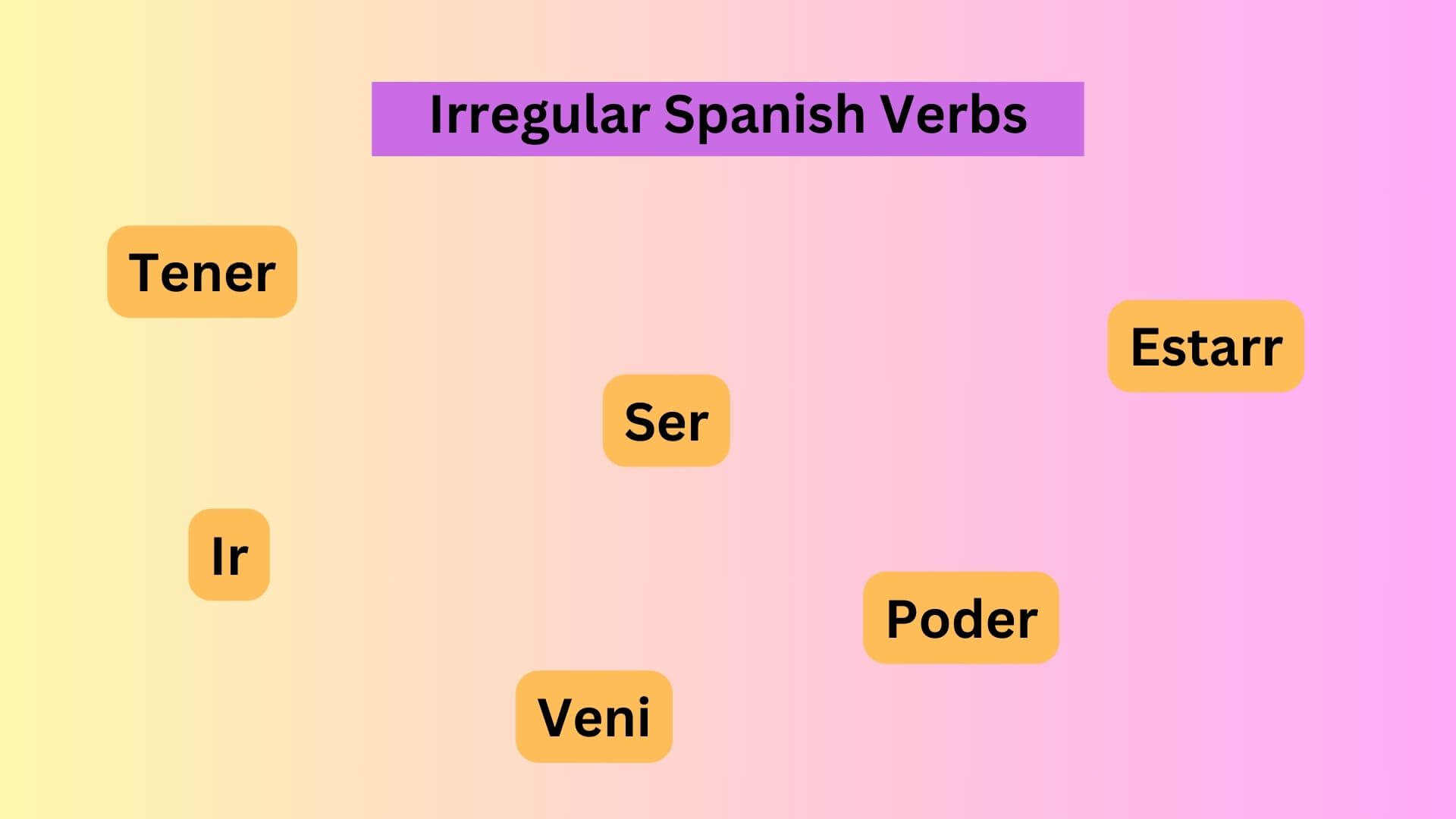If you want to speak Spanish fluently, you need to get a handle on irregular verbs. They don’t follow the usual rules, which makes them tricky but very important. You’ll find these verbs everywhere – in every tense and mood. So, what’s the best way to tackle them? Dive into different situations where Spanish is used. This helps you remember and understand how these verbs work in everyday language.
What are Irregular Verbs in Spanish?
Irregular verbs in Spanish can trip you up as you learn the language. They don’t follow the usual rules of verb endings like -ar, -er, or -ir. Instead, they change in unexpected ways. You might see different stems or endings; sometimes, the whole verb looks different. These changes show up across various tenses and moods. So, it’s essential to practice them a lot. Getting a handle on these verbs is crucial.
Mastering 58 Irregular Spanish Verbs

To get a grip on the 58 most irregular Spanish verbs, you need to start by figuring out how these verbs like to break the rules. Some change their stem, and others have odd spelling changes. Dive into verbs like ‘ser,’ ‘tener,’ and ‘ir.’ Learn how they twist and turn through different tenses. Knowing these will help you speak Spanish more fluently and accurately.
| # | Spanish Verb | English Translation |
|---|---|---|
| 1 | Ser | to be (essential) |
| 2 | Estar | to be (conditional) |
| 3 | Tener | to have |
| 4 | Hacer | to do, to make |
| 5 | Poder | to be able to, can |
| 6 | Decir | to say, to tell |
| 7 | Ir | to go |
| 8 | Ver | to see |
| 9 | Dar | to give |
| 10 | Saber | to know |
| 11 | Querer | to want, to love |
| 12 | Llegar | to arrive |
| 13 | Pasar | to pass, to spend time |
| 14 | Deber | must, to owe |
| 15 | Poner | to put, to place |
| 16 | Parecer | to seem, to appear |
| 17 | Quedar | to stay, to remain |
| 18 | Creer | to believe |
| 19 | Hablar | to speak |
| 20 | Llevar | to carry, to wear |
| 21 | Dejar | to leave, to let |
| 22 | Seguir | to follow, to continue |
| 23 | Encontrar | to find |
| 24 | Llamar | to call |
| 25 | Venir | to come |
| 26 | Pensar | to think |
| 27 | Salir | to leave, to go out |
| 28 | Volver | to return |
| 29 | Tomar | to take, to drink |
| 30 | Conocer | to know, to meet |
| 31 | Vivir | to live |
| 32 | Sentir | to feel |
| 33 | Tratar | to try, to treat |
| 34 | Mirar | to look, to watch |
| 35 | Contar | to count, to tell |
| 36 | Empezar | to begin |
| 37 | Esperar | to wait, to hope |
| 38 | Buscar | to search, to look for |
| 39 | Existir | to exist |
| 40 | Entrar | to enter |
| 41 | Trabajar | to work |
| 42 | Escribir | to write |
| 43 | Perder | to lose |
| 44 | Producir | to produce |
| 45 | Ocurrir | to occur |
| 46 | Entender | to understand |
| 47 | Pedir | to ask for, to request |
| 48 | Recibir | to receive |
| 49 | Recordar | to remember |
| 50 | Terminar | to end, to finish |
| 51 | Permitir | to permit, to allow |
| 52 | Aparecer | to appear |
| 53 | Conducir | to drive |
| 54 | Ofrecer | to offer |
| 55 | Imaginar | to imagine |
| 56 | Realizar | to carry out, to realize |
| 57 | Descubrir | to discover |
| 58 | Escribir | to write (duplicate) |
Types of Irregular Verbs
Let’s talk about stem-changing verbs first. These verbs change their stem vowels when you conjugate them. For example, ‘ pensar’ switches from ‘e’ to ‘ie’ in most present tense forms. Then there are orthographic-changing verbs. These verbs change their spelling to keep the sound consistent. For example, ‘proteger’ becomes ‘protejo’ in the first person singular present indicative. Lastly, we have radically irregular verbs. These verbs don’t follow normal patterns at all. Their stems can change a lot or use completely different forms. ‘Ser’ and ‘ir’ are good examples; they’re very irregular across different tenses.
| Type | Description | Examples |
|---|---|---|
| Stem-Changing Verbs | Vowel changes in the stem in certain forms. | pensar → pienso, dormir → duermo |
| Orthographic Changes | Changes in spelling to maintain pronunciation. | proteger → protejo, tocar → toque |
| Irregular Yo Forms | Regular in most forms but irregular in the first person singular present indicative. | salir → salgo, hacer → hago |
| Completely Irregular Verbs | Do not follow regular patterns in multiple forms and tenses. | ser, ir, tener, estar |
| Verbs with Irregular Preterite Forms | Unique preterite forms that do not fit regular patterns. | ser/ir → fui, tener → tuve |
| Irregular Participles | Irregular past participles, used in perfect tenses and as adjectives. | escribir → escrito, romper → roto |
| Verbs with Irregular Subjunctive Forms | Irregularities in the subjunctive mood. | saber → sepa, tener → tenga |
Common Irregular Verbs and their Conjugations
Mastering common irregular Spanish verbs is key to speaking the language well. Some of the most important ones are ‘ser,’ ‘tener,’ and ‘ir.’ Each has its own way of changing. For ‘ser,’ you say ‘soy,’ ‘eres,’ ‘es,’ ‘somos,’ ‘sois,’ ‘son.’ For ‘tener,’ it goes ‘tengo,’ ‘tienes,’ ‘tiene,’ ‘tenemos,’ ‘tenéis,’ ‘tienen.’ And for ‘ir,’ it’s ‘voy,’ ‘vas,’ ‘va,’ ‘vamos,’ ‘vais,’ ‘van.’
These verbs are tricky because they don’t follow the usual rules. But knowing them well is crucial. It might seem tough at first, but with practice, it gets easier. Remember, it’s all about getting used to these unusual patterns. Keep at it; soon, it’ll feel natural when you use them in conversation.
| Verb | Present (yo) | Preterite (yo) | Imperfect (yo) | Future (yo) | Subjunctive (yo) |
|---|---|---|---|---|---|
| Ser | soy | fui | era | seré | sea |
| Ir | voy | fui | iba | iré | vaya |
| Estar | estoy | estuve | estaba | estaré | esté |
| Tener | tengo | tuve | tenía | tendré | tenga |
| Hacer | hago | hice | hacía | haré | haga |
| Poder | puedo | pude | podía | podré | pueda |
| Poner | pongo | puse | ponía | pondré | ponga |
| Saber | sé | supe | sabía | sabré | sepa |
| Venir | vengo | vine | venía | vendré | venga |
| Decir | digo | dije | decía | diré | diga |
| Ver | veo | vi | veía | veré | vea |
| Dar | doy | di | daba | daré | dé |
| Salir | salgo | salí | salía | saldré | salga |
| Quedar | quedo | quedé | quedaba | quedaré | quede |
| Sentir | siento | sentí | sentía | sentiré | sienta |
| Traer | traigo | traje | traía | traeré | traiga |
| Conducir | conduzco | conduje | conducía | conduciré | conduzca |
Conclusion
Simply put, if you want to speak Spanish well, you need to get a handle on the 58 most important irregular verbs. These verbs don’t follow the usual rules, making them tricky and important for everyday conversation. If you practice these regularly, you’ll get the hang of their patterns and your Spanish will improve a lot. So, it’s worth the effort to master these verbs if you’re serious about learning Spanish.

